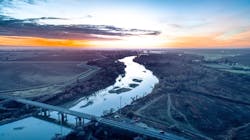California State Auditor Reports on Drinking Water Related Health Issues Faced by Nearly 1 Million Californians
A report released by the California State Auditor analyzed the health issues associated with unsafe drinking water for Californians.
According to the report, approximately 1 million Californians could face long-term health issues after receiving and consuming unsafe drinking water. These impacts include liver, kidney damage, and an increased risk of cancer.
"The State Water Board reported that more than 370 such systems, providing water to more than 920,000 people, were not meeting water quality standards as of December 2021," stated the audit. "More than two‑thirds of these systems are located in disadvantaged communities with significant financial need."
The audit points out that while the State Water Board has funding available to help the failing systems, that "the board has generally demonstrated a lack of urgency in providing this critical assistance. In fact, the time necessary for water systems to complete applications for funding and for the State Water Board to approve and award that funding nearly doubled from 17 months in 2017 to 33 months in 2021."
Even further, the majority of the failed systems were in disadvantaged communities in the Central Valley, including San Joaquin, Stanislaus and Merced counties.
According to the audit, issue lies with the State Water Board's "lack of goals and metrics" for its application process. The audit suggests the State Water Board has yet to implement metrics for performance goals for contracted technical assistance providers, and that staff and contracted providers must not duplicate each other’s outreach efforts.
A change in state law pushed the State Water Board to help smaller water systems, which, according to the State Water Board staff, meant working with a greater number of smaller water systems, ultimately increasing application processing times. The audit adds that the State Water Board has a "cumbersome application process, and its lack of sufficient communication and follow‑up with water systems, are also contributing factors to funding delays."
The auditor's office made several recommendations to the State Water Board, which include streamlining its application process by no longer asking for "unnecessary application documents and financial information," developing a process to fast-track urgent water projects and developing metrics for benchmarks in the application and funding process.
The state water resources control board only has nine technicians to go through applications. The nonprofit Self Help Enterprises works with the water system board to help the State Water Board.
"We talk with people every day. We have great conversations. We have projects moving forward and then when it gets to the point of time to fund something, it can take a year or more to get a funding agreement in place and those are lots of days when people are drinking contaminated drinking water," said program director Jessi Snyder, reported KCRA.
